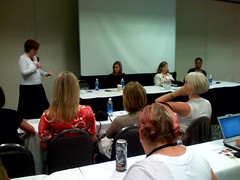The Politics of Inclusion and Exclusion in Online Communities
 Session description: "Comments, link-love, blog-rolls, who’s in, who’s out? The Internet
Session description: "Comments, link-love, blog-rolls, who’s in, who’s out? The Internet
has the potential to be the great equalizer, to breakdown artificial
barriers. Is that what we’re doing, or are we all sticking to our
respective corners of the online world? What signposts do those who
feel outside the online majority look for when deciding if an online
community will be welcoming to "people like me." Can you build
community that becomes more inclusive, rather than exclusive — and does
it have broader social implications if you do (or don’t)? Join Joy Palmer, Liza Barry-Kessler, Dory Devlin and Valencia Roner
as they take a look at this often-sensitive subject. We’ll cover
everything from anecdotal experiences to research data on how online
communties tend to behave and evolve."
Audience: Do niche communities / niche blogs make people connect only with similar people who share the same niche?
Valencia: I don’t limit myself (on my blog). I make sure the audience knows that I’m open to anything.
Switching gears…
Kelli: What about when someone writes something that’s very important, but is written to you privately? Is there a way to bring that conversation out into the open?
Valencia: You need to take it on a case-by-case basis. You can also talk about it, but make the person anonymous.
Heather B.: I’ve noticed that sometimes people will send you things privately that they don’t want to put in the comments, because they felt it might offend you.
Audience: You can also expand/rethink your blogroll, to add blogs that you think are interesting, but don’t necessarily mirror the things your blog usually covers.
Viv: I have three blogs. I have a mom blog, but I also have a gaming blog. I found that Stumbleupon has been a good tool to show new things to my friends.
Gena: I am African America. But when I’m writing about software, or FEMA, I’m writing about who I am right now. I had to come to a place where, no matter what, this is the person who I am today and whatever you’re reading is filtered through my experience. It took a while for me to feel safe enough to say "this is who I am." I intersect on a lot of different communities. If I’m welcomed in that community, I’m going to go back and forth.
Valencia: I think we’re the sum total of our experiences. The beauty of places like this, and the beauty of the blog is that we can interact.
Holli: How did I deal with this? By taking the power of other people away for people to attack me, and setting the rules.
Skye Kilaen: We have a comment policy in place, so our visitors don’t need to armor up before reading the comments. If it’s not a safe space, you’re systematically cutting out a large number of people and participation who don’t feel it’s safe to be there.
Lilly: I wonder if people who are mean are more likely to comment more? How do we make it so that ‘nice’ people aren’t intimidated by others out there?
Audience: When getting trolled, I suggested to the troll to start their own blog. So she did. (And at that point I knew I’d made it.) We don’t think of the trolls as part of our community.
Audience: I put a post out where I asked readers what their favorite blogs are. I got a ton of comments, and there was this "web of inclusion" that was created.
Liza: You can put inclusive asides in posts.
Joy: The element of risk is one worth taking. You might not feel that you have the "right" to speak about something, but one way to reach out is to just write. Another way to reach out is via the blogroll. There are designs and visual cues that you can put on the blog.